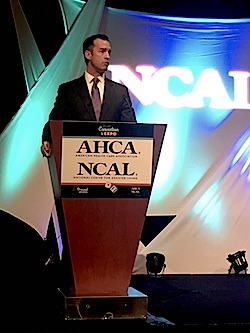
Las Vegas — The state of affairs in the nation’s capital puts assisted living in a strong position to maintain regulation at the state level, National Center for Assisted Living Executive Director Scott Tittle said Sunday to the more than 200 assisted living professionals attending the opening session of the 11th Annual NCAL Day at the Mandalay Bay Convention Center.
Republicans should support the status quo, and the party controls both chambers of Congress as well as the White House, he noted. “But that doesn’t mean we are without risk,” Tittle said.
Democrats, moderate and Tea Party Republicans, and President Donald Trump himself complicate matters, he said.
“We’ve seen some threats this year, demonstrating we can never sit back and assume that all will be alright,” Tittle said.
The biggest threat to assisted living this year has been the attempt to reform Medicaid as part of efforts to repeal and replace the Affordable Care Act, he said.
“While I realize Medicaid is not the primary payer for most of you, NCAL considers it a top priority to ensure you can care for vulnerable residents,” Tittle told attendees. “Medicaid is also the strongest link we have to the federal government.”
Block grants or per capita caps for the elderly, disabled and others proposed as part of healthcare reform efforts “would have drastically cut the amount of money the federal government sends to the states over time,” he said. “As a profession that is expecting the largest surge in the senior population we have ever seen, we knew this was unacceptable.”
AHCA/NCAL members sent more than 100,000 letters and emails to members of Congress to fight the proposed cuts, he said.
NCAL also continues to monitor implementation of the home- and community-based settings rule, for which earlier this year the Centers for Medicare & Medicaid Services pushed the compliance deadline back three years, to 2022.
Through waivers, “many assisted living communities apply for these programs, allowing 15 percent of residents to rely on Medicaid for their daily long-term care,” he noted.
NCAL, with its state affiliates and other organizations through the Center for Excellence in Assisted Living, will continue to relay concerns about the rule to CMS as warranted, Tittle said.
The executive director encouraged members to attend AHCA/NCAL’s Congressional Briefing in June and to forge relationships with federal and state policymakers, help them understand the industry and its challenges and invite them to tour communities.
Further, he said, participation in AHCA/NCAL’s LTC Trend Tracker, Quality Awards and Quality Initiative should “help demonstrate to policymakers that we don’t need federal regulation to ensure the utmost care for our residents.”
Also during the day-long NCAL Day:
- Opening keynote speaker Rishi Manchanda, M.D., shared breakthrough solutions to reinvigorate healthcare by addressing the social and environmental conditions at the source of illness. Manchanda praised NCAL’s efforts to encourage quality and collect data, saying the need is great because data are scarce regarding assisted living in the United States.
- A luncheon program included the presentation of five awards (read about the winners here and here). Workforce issues are the “most critical issues we have for long-term care,” said Roger Bernier, chairman of NCAL’s Workforce Committee and president and chief operating office of Chelsea Senior Living, Fanwood, NJ. Bernier presented four of the awards, which he said are one way to recognize the contributions that staff members make to their employers’ success and to boost morale and retention efforts.
- Attendees heard from speakers at additional sessions on topics including communication about end-of-life care goals and planning; improving the delivery of long-term services and supports in a range of settings; themes of high-performing organizations; and the effects of dementia on quality of life.
- The day closed with a panel of assisted living providers, diverse in their operational size, discussing key issues for the profession.
Sunday also included Rehabilitation Therapy Program and Long-Term Care Meeting Planners gatherings; a course on implementing CARES online dementia training and the Alzheimer’s EssentiALZ certification program; sessions about Phase 2 requirements of participation for skilled nursing facilities and the AHCA/NCAL Gold and Silver Quality Awards; a welcome reception; and the NCAL state affiliates meeting.
The full convention begins Monday and ends Wednesday. Expo Hall hours are 11:30 a.m. to 3 p.m. on Monday and 11 a.m. to 2 p.m. on Tuesday.
From the December 01, 2017 Issue of McKnight's Senior Living



